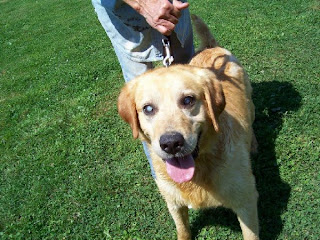Because we humans are so dependent on our sense of sight, we often forget that other animals are not as reliant on it and therefore do not miss it much when it is gone. I recently had the honor of examining a sweet blind Golden/Lab mix named Nellie.* Nellie has Progressive Retinal Atrophy (PRA), a genetic form of progressive blindness that can affect a number of breeds, including Labrador Retrievers. Although only 3 years old, Nellie was nearly euthanized because she could no longer be a decent hunting dog. Fortunately Nellie was sent to a blind dog rescue group and was recently adopted by some dear clients.
 |
| A blind Golden/Labrador mix like Nellie |
I have no doubt Nellie will adapt to her new home and be a fine companion for her human family. The real tragedy in this story is that PRA and many other hereditary diseases can be avoided with careful breeding programs. There is a DNA blood test available to determine if potential doggie parents carry the genes for PRA. Most dogs should also undergo Canine Eye Registration Foundation (CERF) examination by a certified veterinary ophthalmologist prior to breeding.
This recommendation comes from personal experience. I nearly made the mistake of breeding our English Springer Spaniel GrrrD. She was a lovely hunting dog, free of obvious defect, and it seemed like a good idea to allow her to procreate! During my veterinary school training, my faithful "guinea pig" GrrrD was diagnosed with retinal dysplasia. Even though GrrrD had adequate vision, any future pups could have been blind. With that knowledge in hand, it was an easy decision to spay her.
Hereditary blindness is dramatic, but thankfully not that common. There are many other more painful and difficult conditions that can be avoided through informed decision making at the time of breeding. Ask your veterinarian for information before breeding. Future pet owners will thank you for your diligence.
*Name changed to protect privacy.
No comments:
Post a Comment